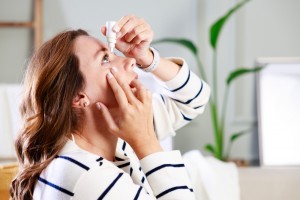How Hormonal Changes Can Influence Dry Eye
 Dry eye syndrome is a common ocular condition characterized by insufficient tear production or rapid evaporation, leading to discomfort and potential vision problems.
Dry eye syndrome is a common ocular condition characterized by insufficient tear production or rapid evaporation, leading to discomfort and potential vision problems.
Although multiple factors contribute to dry eye, hormonal changes are a major factor in its development and progression. Hormones influence the function of tear-producing glands and the composition of the tear film, making individuals more susceptible to dry eye during hormonal fluctuations.
Menopause and Dry Eye
Menopause is a significant hormonal transition that often correlates with an increased prevalence of dry eye symptoms.
As estrogen levels decline during menopause, the function of the lacrimal and meibomian glands can be affected, leading to changes in tear production and quality.
Estrogen plays a role in maintaining the homeostasis of the ocular surface, and its decrease can result in reduced tear production and alterations in the lipid layer of the tear film. This can lead to increased tear evaporation and instability.
Thyroid Hormones and Ocular Surface Health
Thyroid hormones, including the eyes, are crucial in regulating metabolism. Both hyperthyroidism and hypothyroidism can impact ocular surface health and contribute to dry eye symptoms.
In hyperthyroidism, increased thyroid hormone levels can lead to increased proptosis (bulging of the eyes) and incomplete blinking, which can cause increased tear evaporation and exposure to keratopathy.
Conversely, hypothyroidism can result in decreased tear production and changes in the lipid composition of the tear film.
Hormonal Contraceptives and Dry Eye
The use of hormonal contraceptives, particularly those containing estrogen and progestin, can influence tear production and ocular surface health. While the effects can vary among individuals, some studies have shown that oral contraceptive use may be associated with an increased risk of dry eye symptoms.
Some women may experience changes in tear film stability or meibomian gland function while using hormonal contraceptives, potentially leading to dry eye symptoms or exacerbating existing dry eye conditions.
Get Dry Eye Treatment in Chicago
Dry eye syndrome affects many, but for those experiencing hormonal changes, the challenges are particularly acute. If you suffer from dry eye symptoms and suspect hormonal changes might be a factor, seeking expert advice is crucial.
At Millennium Park Eye Center, our specialists offer comprehensive evaluations to tailor treatment plans that address your specific needs. Take charge of your eye health today by contacting us at 312-996-2020 for a consultation.
Let us help you achieve optimal ocular comfort and health.


